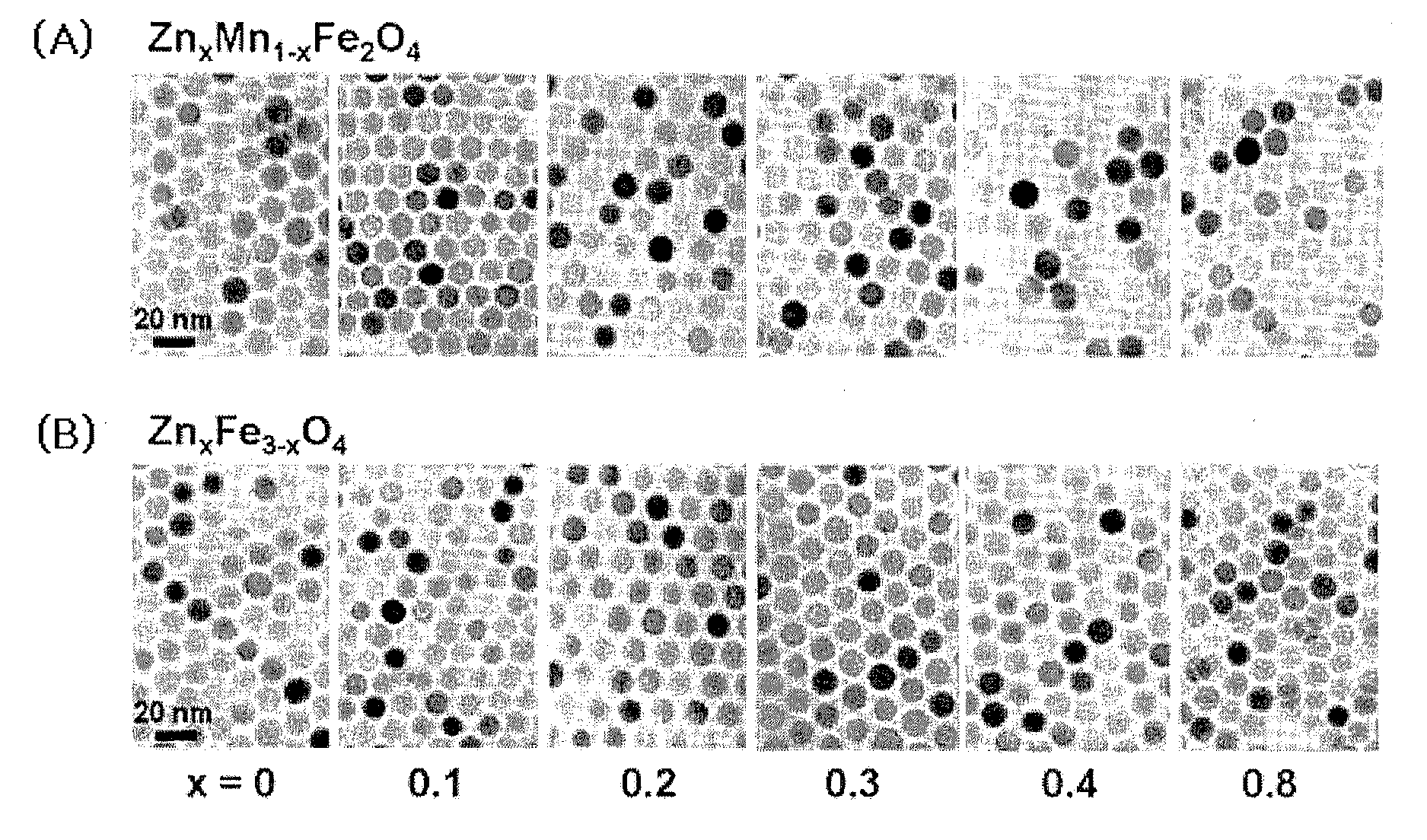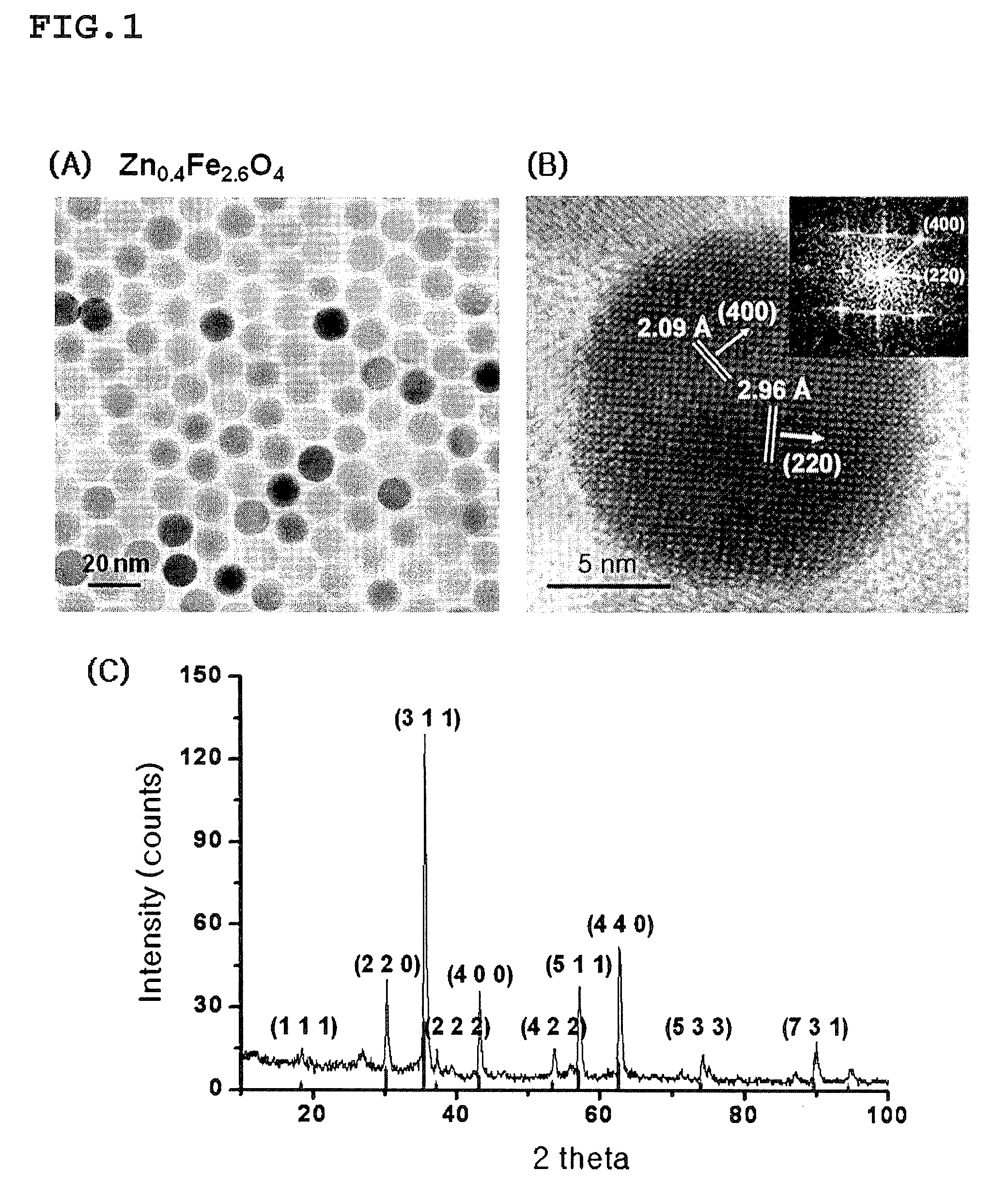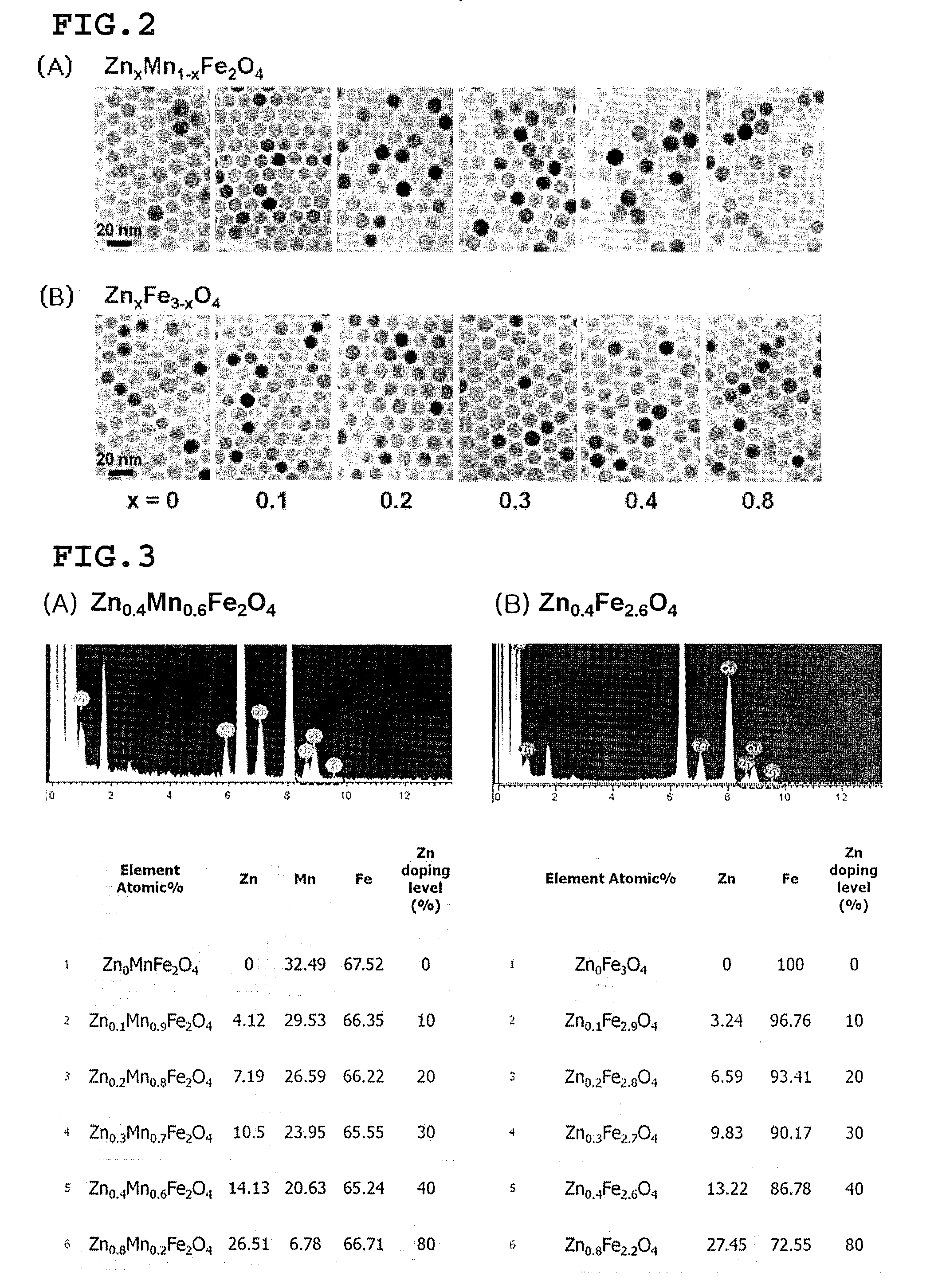Magnetic resonance imaging contrast agents comprising zinc-containing magnetic metal oxide nanoparticles
a magnetic metal oxide and contrast agent technology, applied in the field of magnetic resonance imaging contrast agent, can solve the problems of reducing signal enhancement, and achieve the effects of excellent magnetic property, significant magnetic property increase, and low cytotoxicity
- Summary
- Abstract
- Description
- Claims
- Application Information
AI Technical Summary
Benefits of technology
Problems solved by technology
Method used
Image
Examples
example 1
Synthesis of a Zinc-Containing Ferrite Nanoparticle MRI Contrast agent of ZnxM1-xFe2O4 (M=Fe or Mn, x=0.1, 0.2, 0.3, 0.4, and 0.8) Having the Core Size of 15 nm and Coated with Dimercaptosuccinic Acid
[0130]The zinc-containing ferrite nanoparticle MRI contrast agent of ZnxM1-xFe2O4(M=Fe or Mn, x=0.1, 0.2, 0.3, 0.4, and 0.8) having the core size of 15 nm was synthesized as an example of the MRI contrast agent comprising the zinc-containing metal oxide nanoparticles described in the specification of the present invention, by the methods disclosed in Korean Patent Nos. 10-0604975, 10-0652251, and 10-0713745, PCT / KR2004 / 002509, Korean Patent No. 10-0604975, PCT / KR2004 / 003088, PCT / KR2007 / 001001 and Korean Patent Application No. 2006-0018921. ZnCl2, FeCl2 or MnCl2, and Fe(acac)3 (acac=acetylacetonate) were added to a trioctylamine solvent in which 20 mmol oleic acid and oleylamine were contained. The reaction was performed at 200° C. and at 300° C. for 2 hour, to synthesize 15 nm ZnxM1-xFe...
example 2
Synthesis of a Zinc-Containing Ferrite Nanoparticle MRI Contrast Agents of Zn0.4M0.6Fe2O4 (M=Fe or Mn) Having the Core Sizes of 6, 9, and 12 nm and Coated with Dimercaptosuccinic Acid
[0134]10 mmol oleic acid and 30 mmol oleylamine were added in conjunction with ZnCl2, FeCl2 or MnCl2, and Fe(acac)3 to a trioctylamine solvent. The solution was subjected to a thermal decomposition at 180° C. and 250° C. for 3 hours, to synthesize 6 nm Zn0.4M0.6Fe2O4 (M=Fe or Mn) nanoparticles. In order to synthesize the nanoparticles having different sizes of 9 nm and 12 nm, the precursor materials were added in the same amount to the trioctylamine solution in which the ratio of the oleic acid and oleylamine was changed, and heated and reacted with each other by using the same method and then performing the precipitation.
[0135]Thereafter, the DMSO solution in which the dimercaptosuccinic acid was dissolved in an excessive amount was added to the nanoparticles that were dispersed in toluene in an amount...
example 3
Synthesis of a Zinc-Containing Cobalt Ferrite Nanoparticle MRI Contrast Agent of ZnxM1-xFe2O4 (M=Co or Ni, x=0.3 and 0.4) Having there Size of 12 nm and Coated with the Dimercaptosuccinic Acid
[0137]The zinc-containing ferrite nanoparticle MRI contrast agent of ZnxM1-xFe2O4 (M=Co or Ni, x=0.3 and 0.4) having the core size of 12 nm was synthesized by using the following methods, as an example of the MRI contrast agent comprising the zinc-containing metal oxide nanoparticles of the present invention. The nanoparticles were synthesized 20 mmol oleic acid and oleylamine were added in conjunction with ZnCl2, CoCl2 or NiCl2, and Fe(acac)3 to a trioctylamine solvent. The solution is subjected to a thermal decomposition under 200° C. and 300° C. for 2 hours, to synthesize Zn0.3M0.7Fe2O4 (M=Co or Ni) nanoparticles of 12 nm in size. In order to synthesize the nanoparticles having different sizes of 9 nm and 12 nm, the precursor materials were added in the same amount to the trioctylamine solut...
PUM
| Property | Measurement | Unit |
|---|---|---|
| hydrodynamic diameter | aaaaa | aaaaa |
| diameter | aaaaa | aaaaa |
| diameter | aaaaa | aaaaa |
Abstract
Description
Claims
Application Information
 Login to View More
Login to View More - R&D
- Intellectual Property
- Life Sciences
- Materials
- Tech Scout
- Unparalleled Data Quality
- Higher Quality Content
- 60% Fewer Hallucinations
Browse by: Latest US Patents, China's latest patents, Technical Efficacy Thesaurus, Application Domain, Technology Topic, Popular Technical Reports.
© 2025 PatSnap. All rights reserved.Legal|Privacy policy|Modern Slavery Act Transparency Statement|Sitemap|About US| Contact US: help@patsnap.com



